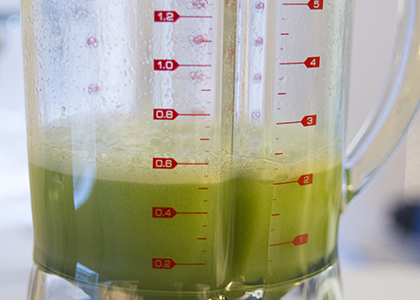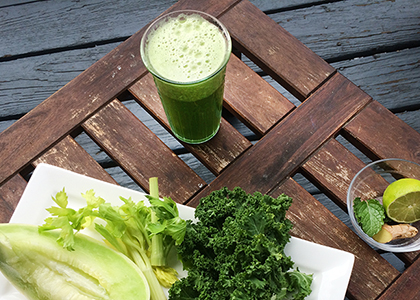
Sugar Shock: Juicing with Diabetes
By Stacy Kennedy, MPH, RD, CSO, LDN; Reboot Nutritionist
From a typical point of view, juice and diabetes don’t go well together. This is because juice as we traditionally think of it, is known to have a high glycemic index and glycemic load that contribute to elevated blood sugars, insulin resistance, weight gain, obesity and diabetes risk. Yikes! Of course the juice we’re talking about here is the factory processed type found on your grocer’s shelf that’s pasteurized, may have little actual “juice”, or contain additives like refined sugars linked with contributing to the obesity epidemic or artificial sweeteners.
But what about fresh juice you make in your juicer? Does that have the same detrimental effects on blood sugar and health? Maybe not. But the jury is most certainly still out. Let’s look closer at Rebooting and juicing with diabetes.
All Juice is NOT Created Equal
Let’s start with the premise that all juice may not be created equal. You’ve read that All Calories Are Not Created Equal when it comes to nutrients, and All Sugars Are Not Created Equal, so why would juice be any different? The leading bottled, commercial brands of orange juice racked up over $2 billion in combined sales in 2014, and that’s just orange juice!
The juice and smoothie market is valued at $23 billion as of 2013.
This stake in the market share also means that research results funded by the beverage industry may be difficult to discern. In other words, Harvard School of Public Health found that studies funded by the beverage industry are four to eight times more likely to show beneficial or favorable results.
Bottled Buyers Beware
As you are probably aware, many brands of bottled juice may not be best for your blood sugar or health. But since not all bottled juices are created equal either, you may find some pre-made that are diabetic-friendly, like those using HPP with many veggies and little fruits, free of additives. But buyer beware and read the ingredients and nutrition facts panel closely, especially for sugar, before swigging down that expensive bottle of cold-pressed juice. Some may have as many as 53 grams of sugar per 16 oz container and are blended, making it a smoothie, not a juice.
Can Someone with Diabetes Still Juice?
While pre-packaged juices come with inherent challenges for maintaining good glycemic control, fresh isn’t necessarily the same. There are many juicing myths and mounting facts. Learn about juicing myths in this article.
One of these myths is that juice has too much sugar. And if it’s made from all fruit, even local, organic, seasonal fruits from your farmer’s market, the removal of fiber during juice extraction and the amount of carbohydrates from so many fruits may tip the balance of sugar over the edge. But don’t fret!
When it comes to juicing and type 2 diabetes here are practical tips to help construct your juice to be the healthiest possible for you:
- Increase overall hydration with water to help glycemic control
- Eat a well-balanced, plant-based diet
- Follow the 80/20 guideline and keep the amount of fruit low, like ½-1 cup/piece per 16 oz serving
- Consider consuming your juice with a meal
- Be physically active and include exercise
- Add healthy protein or fats to your juice like Reboot’s Protein Powder or other similar brand, or a teaspoon of plant-based oil like walnut, flax or avocado
- Add spices like cinnamon which may offer additional blood sugar benefits
- Pay attention to the total amount of carbohydrates in your glass
Here are some recipes to help you get started:
Reading the Research
With more and more studies showing that increased consumption of sugar sweetened beverages, like fruit juice, raise the risk of type 2 diabetes, it’s easy to scratch the entire category of juice off your healthy eating plan. But what does this research really mean? This is where it gets even more confusing. Most nutrition studies looking at juice intake and health risks involve compiling data from surveys that people have filled out on their usual or current eating habits. This type of study doesn’t show cause and effect but associations or correlations. One issue with regard to juice specifically, is that the surveys used don’t tend to separate out if the juice is freshly made in your juicer or store-bought and not HPP. So at the end of the day, from an evidence-based perspective, we have no idea if the juice linked with diabetes risk includes those made from mostly veggies in your kitchen counter juicer. My expert opinion is that this type of juice wouldn’t carry the same risks, but we most certainly need more and better research to really say this with confidence.
Research is growing looking at vegetable juice, again not necessarily made fresh in your juicer. But still, some experts feel that vegetable juice can effectively and safely help to “close the dietary vegetable gap,” to help the population reach recommended goals for produce consumption. Juicing can be an important tool in your toolbox, because current estimates show the population falling short of the CDC’s goals – with 32.6% having 2+ fruits per day and 27.2% 3+ veggies, vs the goal of 75% & 50% respectively.
Juicing with Type 2 Diabetes Success Stories
While the data may still be emerging, anecdotally, we’ve seen firsthand how a Reboot can be helpful for individual’s wellness. Read these stories of people who have reduced or even stopped certain diabetes medications, lost weight and regained their health with the power of plants. **Note these individuals worked closely with their doctor. Results may not apply to everyone. Speak with your doctor before starting a Reboot if you have diabetes or take medications.
Darrell No Longer Needs Diabetes Meds
Allan Changed His Life for Good After a 5-Day Reboot
Finding the ‘Fabulous Fatties’ Saved Kate’s Life
Work with your doctor and dietitian closely before rebooting, especially if you have diabetes. Consider joining our customized, 60 Day Guided Reboot for Diabetes for support and expert guidance with a tailored meal plan.
